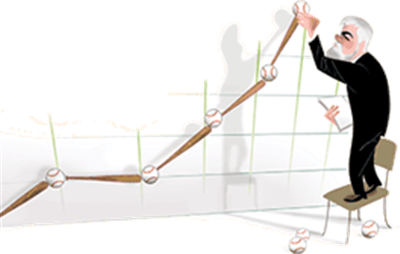(单词翻译:单击)
“I’m not a statistician,” says Bill James, a legendary statistician. He adds, “I’m also a very bad statistician. I’m sloppy, I’m impatient, I make mistakes and I don’t care about them.”
“我不是统计学家,”具有传奇色彩的统计学家比尔•詹姆斯(Bill James)称。他补充道:“我还是个非常糟糕的统计员。我粗心,没耐心,会出错误,而且我不以为意。”
This “bad statistician” is arguably the father of today’s analytics revolution. In the 1970s, while minding the furnaces of a pork-and-beans plant in Kansas, he began to reinvent baseball stats. Data analysis has since spread everywhere from financial trading to political punditry. Recently James even applied analytics to serial killers.
这位“糟糕的统计员”可谓是当今分析学革命之父。上世纪70年代,当詹姆斯还在堪萨斯(Kansas)操作一家猪肉炖豆厂的火炉时,他开始彻底改造棒球统计学。自此之后,数据分析推广至各个领域——从金融交易到政治解析。最近,詹姆斯甚至把分析学应用在了连环杀手身上。

I met him earlier this month at the “sports summit” of the Dublin Web Summit, one of his rare ventures into public space. Twenty thousand techies were running around showing each other their apps. James, a plump and grey-bearded 65, was possibly the oldest person there and almost the only one wearing a suit. Scrunched awkwardly into an armchair, he looked much smaller than his 6ft 4in. He rarely meets your eye and often searches agonisingly for the right word. He’s short on “people skills”, he admits. But he has rethought the world using numbers.
不久前,我在都柏林网络峰会(Dublin Web Summit)的“体育峰会”(sports summit)上遇到了在公众场合鲜有露面的詹姆斯。2万名技术高手在会场上穿梭,向彼此展示自己研发的应用软件。65岁的詹姆斯体态微胖,胡须斑白,可能是在场最为年长的人,也几乎是全场唯一穿西装的人。他别扭地挤在一把扶手椅上,看起来没有6英尺4英寸的身高那么魁梧。他很少与你眼神接触,说话时也经常痛苦地斟字酌句。他承认,自己不擅长“人际技巧”。不过,他借助数字重新思索这个世界。
James could see things afresh partly because he was a born outsider. “My father was a small-town school janitor. I had that strong sense when I was young: I just didn’t have any innate talent for being nice to people. I’m not a type of person that academics were going to take under their wing. And it comes from the way I grew up and from being a contrarian. I just don’t naturally accept what I’m told.”
詹姆斯能够以全新视角看待事物,部分原因在于他生来就是个局外人。“我的父亲是一所小镇学校的清洁工。我从小就有种很强的感觉:我就是没有对人客套的天赋。我不是学者会收入门下的那类人。这源自我成长之路,以及我与别人相反的思维。我就是不会轻易接受别人告诉我的事。”
When he began studying baseball, he instinctively disbelieved the game’s received wisdom. He assembled new stats to show, for instance, that time-honoured baseball strategies like bunting or base-stealing were dumb. He says, “My skill was seeing new things that people weren’t measuring but that we could measure.” In short, the bad statistician had imagination.
当开始研究棒球时,他本能地对有关棒球赛的公认智慧产生了怀疑。例如,他收集了新的数据来证明,像短打或盗垒这种由来已久的棒球策略都是不明智的。他称:“我的能力在于看到别人不在衡量、而我们可以衡量的新参数。”简言之,这位糟糕的统计员富有想象力。
He had also chosen the right topic. Baseball began collecting game stats early. By the time computers became widely available, it had 100 years of numbers waiting to be crunched. James says, “The analytic revolution hit in baseball before it did in finance, for example, and that made baseball sort of a paradigm of how this works.” It’s no accident that today’s leading political number-cruncher, Nate Silver, began as a baseball statistician.
他还会选择合适的研究对象。棒球很早便开始收集比赛数据。当计算机变得普及时,这项运动已经有了100年的数据等待研究。詹姆斯称:“在应用于金融之前,分析学的革命便已在棒球界展开,这使得棒球在某种程度上成为分析学应用的范例。”并非偶然的是,当今顶尖的政治数据分析师纳特•西尔弗(Nate Silver)是棒球统计员出身。
James had another useful attribute for a revolutionary: good prose. Quite simply, he is an astonishingly skilled writer of non-fiction. In 1977 he self-published his first photocopied, stapled Baseball Abstract. His style – American vernacular wrapped in formal grammar – soon spread his fame. I currently cannot stop reading his 2011 book, Popular Crime. His insights pour out: serial killers are almost always thieves, too; men who murder their wives are typically having an affair; a secret-service agent startled by Lee Harvey Oswald’s shots probably accidentally fired the bullet that killed John F Kennedy.
詹姆斯还有另外一点身为革命者的有利特质:写得一手好文章。很简单,他是一名天赋异禀的非小说作家。1977年,他自己出版了第一本用复印机和订书机装订成册的书——《棒球汇编》(Baseball Abstract)。他的风格——在正规语法包装下的美式白话——迅速使其声名鹊起。最近,我对他2011年所著的《热门罪案》(Popular Crime)爱不释手。他的见解如行云流水般道来:连环杀手几乎也都是窃贼;杀妻者通常都有婚外情;在听到李•哈维•奥斯瓦尔德(Lee Harvey Oswald)的枪声后在惊恐之下意外扣动扳机的一名特勤局(Secret Service)特工,很可能射出了打死约翰•肯尼迪(John F Kennedy)的那发子弹。
When I ask James for his literary inspirations, he names economists: Paul Samuelson, Robert Fogel and “early writers in econometrics”. Good analysts tend to make good writers, he explains.
当我问及詹姆斯的文学启蒙时,他说出了几名经济学家的名字:保罗•萨缪尔森(Paul Samuelson)、罗伯特•福格尔(Robert Fogel)以及几个“计量统计学的早期著述者”。他解释称,优秀的统计学家倾向于成为好作家。
James remained an outsider for decades. Had he never been recognised, he admits, “It would have eaten me away. I’d have been bitter and sarcastic, like when I was young.” But gradually insiders began paying attention. One early reader was a commodities trader named John W Henry. Later Henry bought the Boston Red Sox. Now James advises the club on baseball matters: “Should we sign this player? Should we use this player in this way?” James has also helped statisticians from Henry’s English football club, Liverpool.
詹姆斯保持局外人的身份达数十年。他承认,如果从未获得认可,“那会让我极度失落。我会变得愤世嫉俗、尖酸刻薄,就像我年轻时那样。”不过,圈内人逐渐开始关注他。詹姆斯的早期读者中有一位名为约翰•W•亨利(John W Henry)的大宗商品交易商。不久后,亨利买下了波士顿红袜队(Boston Red Sox)。如今,詹姆斯是该俱乐部棒球事务的顾问:“我们应该签这名球员吗?我们可以这样用这名球员吗?”詹姆斯还为亨利的英格兰足球俱乐部——利物浦(Liverpool)的统计员提供帮助。
. . .
……
Almost every big sports club now employs a team of Jamesian analysts. However, the big decisions are still made by smartly dressed executives. James admits he couldn’t do their job. “You need a lot better people skills than I have. I don’t carry a phone. I don’t understand how people who carry a phone can get any work done.”
如今,几乎所有的大型体育俱乐部都聘请了一个詹式分析师团队。然而,重大决定仍然由西装笔挺的经理们做出。詹姆斯承认,他做不了经理的工作。“那需要比我出色得多的人际交往能力。我不随身携带手机。我不明白带手机的人怎么能完成工作。”
Still, the outsider has finally become an American success. “I’m very pleased,” he admits. “In a sense I won my argument with the world. The world has been very good to me – as an adult, not when I was a child.
话说回来,这位局外人最终成为了一个美国标杆。“我很高兴,”他坦白道,“在某种意义上,我向世界证明了自己的论点。世界对我不错,当然这是在我成年之后,在我小时候并非如此。”
“I’ve gagged on the fallacies of all organised systems of thought.” But he has ended up creating his own organised system of thought: baseball analytics, known as “sabermetrics”. He invented today’s conventional wisdom. Surely that discomfits him? “A lot of organised sabermetrics doesn’t work,” replies James.
“所有思想组织体系的谬论让我作呕。”不过,他最终创造了自己的思想组织体系:棒球分析学,即“赛伯计量学”(sabermetrics)。他发明了如今的传统智慧。难道这不会困扰他吗?“赛伯计量学的很多理论不管用,”詹姆斯回答称。
“A lot of it’s bullshit. What we don’t know is always – in my own view – a million times bigger than what we do. There will never be a shortage of ignorance.”
“很多都是胡扯。在我认为,我们不知道的事总是远远超过我们知道的事。这世界永远不会缺少无知。”
And he includes himself in that. Bill James is contrarian even about Bill James. Michael Lewis’s book Moneyball lionises him; James, possibly uniquely among sports statisticians, hasn’t read it. “I think that I’m in no sense a phony,” he says, “I think I don’t pretend to be anything I’m not. However, a lot of what people say about me isn’t true. I’m not smarter than anybody.”
而他也把自己归入其中。比尔•詹姆斯甚至是自己的反派。迈克尔•刘易斯(Michael Lewis)所著的《魔球》(Moneyball)对他评价甚高;而詹姆斯很可能是唯一一个没有读过该书的体育统计学家。“我觉得我决不是冒牌货,”他称,“我认为我从不会假装成其他人。不过,别人口中的我有很多不是真的。我不比任何人聪明。”
Then, to his immense relief, I let him go.
然后,我让他离开了,这对他来说是个极大的解脱。


